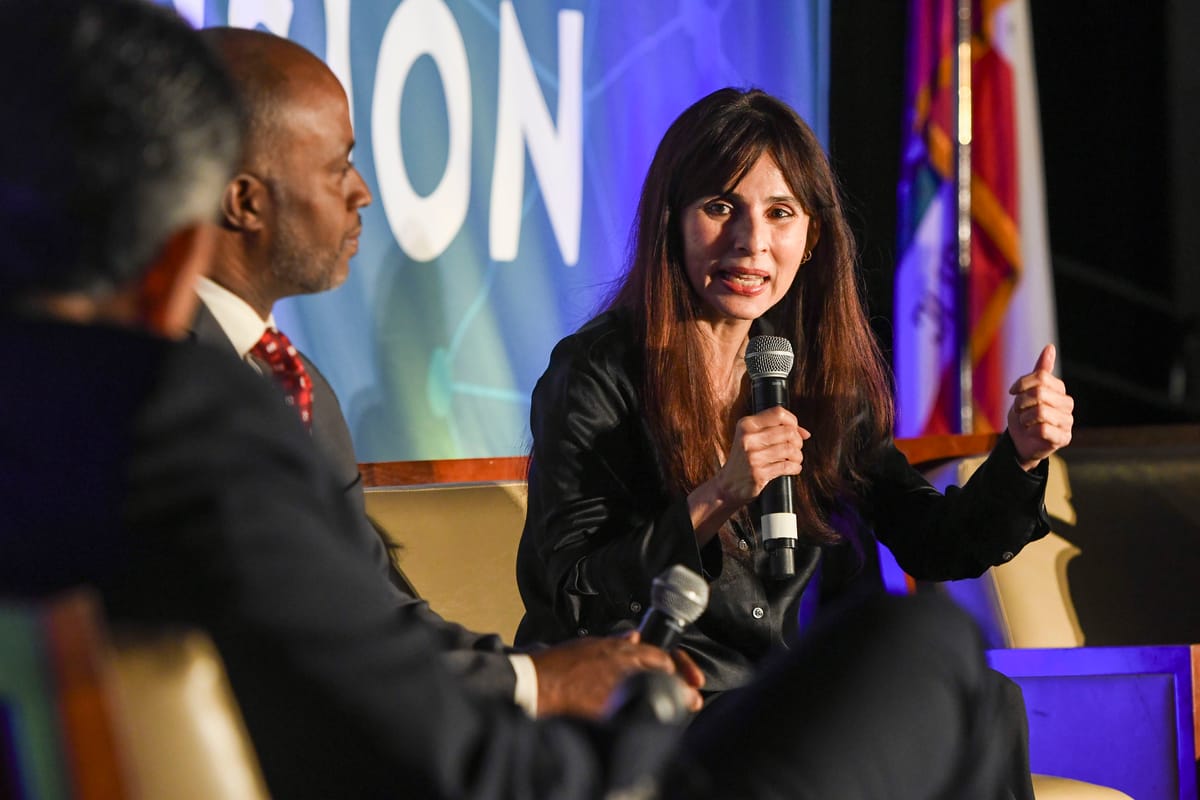Líderes educativos de California enfatizan la necesidad de superar barreras económicas en la Cumbre de ‘Share Your Vision’

Las tasas de graduación de secundaria en California están incrementando y el acceso a la universidad está mejorando.
Sin embargo, los líderes educativos estatales compartieron durante la conferencia, A Shared Vision, que tomó lugar el martes pasado en Riverside que hay la urgente necesidad de abordar las barreras económicas que atrasan a muchos estudiantes.La cumbre de dos días reunió a las partes interesadas que conforman el consorcio Growing Inland Achievement (GIA), que trabaja con los líderes de los distritos de colegios comunitarios, distritos escolares y universidades locales para cerrar las brechas económicas y sociales en la educación.
Durante una plática con la canciller de los Colegios Comunitarios de California, la Dra. Sonya Christian, el Superintendente Estatal Tony Thurmond y el CEO de GIA, Ashish Vaidya, la discusión se centró en los desafíos y éxitos de las colaboraciones entre las instituciones educativas en todos los niveles y el sector privado.
Christian señaló que el verdadero trabajo difícil es desmantelar los silos institucionales que perpetúan la desigualdad.
“Estamos mejorando cada vez más en nuestro trabajo, pero donde realmente reside el trabajo es entre nuestras instituciones”, dijo Christian. “Esos silos son en realidad fallas que pueden mantenernos separados.”
Mientras tanto, Vaidya enfatizó la importancia de fomentar una cultura que promueva la educación superior. “Realmente me molesta a veces que esta retórica parece haberse arraigado, que es: ¿vale la pena la universidad? Puedo compartir datos por todos lados que demostrarán que sí, absolutamente lo vale.”
El Superintendente Estatal Tony Thurmond señaló la importancia de que los estudiantes puedan leer para el tercer grado.
“Si realmente queremos hablar de equidad, debemos cerrar esta brecha y asegurarnos de que nuestros estudiantes aprendan a leer,” dijo Thurmond. “Y que no los dejemos simplemente caer.”
En la Cumbre, GIA también honró a individuos y grupos por sus valiosas contribuciones al éxito educativo y económico en el Inland Empire.
- BLU Education Foundation recibió un premio por su impacto regional, elogiada por ayudar a implementar servicios educativos y apoyar a familias desatendidas.
- El Impact Project del Distrito Escolar Unificado de Rialto fue honrado por aumentar la diversidad en los puestos de instruccion escolar, especialmente para hombres de color.
- El programa Estudiante del Mes del Valle de Coachella, de la Oficina de Educación del Condado de Riverside, fue celebrado por su enfoque centrado en el estudiante.
- Randall Lewis, desarrollador, fue premiado por su excelencia en innovación.
- El Consorcio Inland Empire College Corps fue reconocido por su colaboración, habiendo otorgado becas de $10,000 a más de 1,000 estudiantes y facilitado 165,000 horas de servicio comunitario.
California education leaders emphasize need to overcome economic barriers at shared vision summit
California's high school graduation rates are climbing and access to college is improving. However, state education leaders at the Shared Vision Summit in Riverside on Tuesday emphasized the urgent need to address the economic barriers still holding many students back.
The two-day summit brought together stakeholders who make up the Growing Inland Achievement (GIA) consortium who are working with leaders of the area’s community college districts, school districts and local universities to build on this need to bridge economic and social gaps in education.
During a fireside chat featuring California Community Colleges Chancellor Dr. Sonya Christian, State Superintendent Tony Thurmond, and GIA CEO Ashish Vaidya, the discussion centered on the challenges and successes of collaborations among educational institutions at all levels and the private sector.
Christian pointed out that while progress is being made, the real work lies in breaking down institutional silos that perpetuate inequality.
“We're getting better and better at doing the work, but where the work really lies is across our institutions,” said Christian. “Those silos are actually fault lines that can keep us apart."
Vaidya, meanwhile, stressed the importance of fostering a culture that promotes higher education.
"It really does bother me sometimes this rhetoric seems to have taken root, which is, is college worth it? I can share data up the wazoo that will show it absolutely it does," he said.
State Superintendent Tony Thurmond stressed the importance of closing the achievement gap and ensuring students can read by third grade.
“If we really want to talk about equity, you must close this gap and make sure that our students learn to read,” he said. “And that we don't let them just fall off of a track.”
At the Summit, GIA also honored individuals and groups for their valuable contributions to educational and economic success in the Inland Empire.
- The Blue Educational Foundation received an award for its regional impact, praised for filling service gaps and supporting underserved families.
- The Impact Project of the Rialto Unified School District was highlighted for increasing diversity in teaching positions, especially for men of color.
- The Coachella Valley Student of the Month program, from the Riverside County Office of Education, was celebrated for its student-centered approach.
- Randall Lewis was awarded for excellence in innovation
- The Inland Empire College Corps Consortium was recognized for its collaboration, having provided $10,000 scholarships to over 1,000 students and facilitated 165,000 hours of community service.
